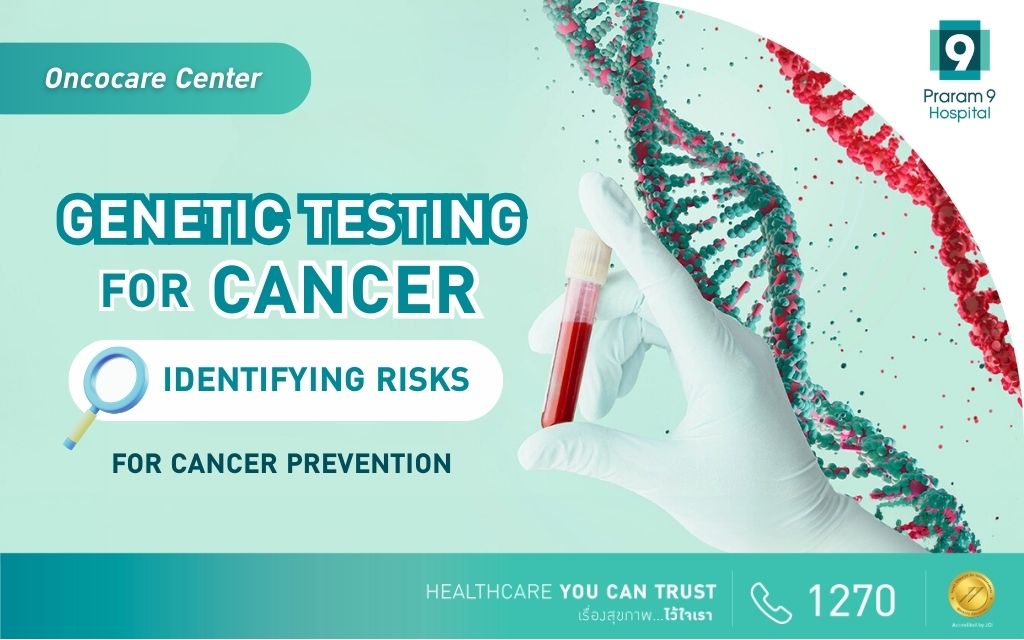Health Articles
Knowledge
Genetic Testing for Cancer: Identifying Risks for Cancer Prevention

Cancer is a serious disease caused by the abnormal growth of cells in the body. These cells can spread to different parts of the body, damaging organ function. Early detection and diagnosis of cancer are crucial as they can help prevent the disease, increase the chances of successful treatment, and reduce mortality rates. One of the modern medical technologies for screening and diagnosing cancer risks is genetic testing. This testing identifies genetic abnormalities that may lead to cancer, enabling the development of appropriate prevention and treatment plans. Genetic testing for cancer can thus be considered a significant advancement in the fight against cancer.
What is Genetic Testing for Cancer?
Genetic testing for cancer is a medical technology that analyzes an individual’s genes or DNA to identify changes or abnormalities that may lead to cancer in various organs. This testing aids in diagnosing and assessing the risk of future cancer development and helps formulate personalized treatment plans for cancer patients.
How Are Cancer and Genes Related?
Cancer is a disease resulting from uncontrolled cell growth, which may result from genetic changes or abnormalities. Genes, the basic units of heredity, determine the characteristics and functions of the body’s cells. Genetic changes can arise from various factors, including inheritance or exposure to environmental carcinogens, such as chemicals, radiation, or viruses.
Types of Genetic Changes Linked to Cancer
Genetic changes associated with cancer typically fall into two main categories:
- Oncogenes: These genes promote normal cell growth and division. However, when mutated, they can lead to uncontrolled cell growth and cancer.
- Tumor Suppressor Genes: These genes control cell growth and repair damaged DNA. Mutations in these genes can impair their ability to regulate cell growth, increasing the risk of cancer.
Forms of Genetic Changes That Lead to Cancer
Genetic changes that may result in cancer include:
- Point Mutations: Single-base changes in DNA sequences can create abnormal proteins, potentially leading to cancer, e.g., mutations in the TP53 gene.
- Insertions and Deletions: The addition or removal of bases in DNA sequences can disrupt protein formation, leading to cancer. An example is deletions in the APC gene, which are linked to colon cancer.
- Chromosomal Translocations: The exchange of chromosomal segments can create abnormal proteins, e.g., changes in the BCR-ABL gene are associated with leukemia.
Types of Cancer Detectable by Genetic Testing
Currently, genetic testing can screen for the risk of various cancers, such as:
- Stomach cancer
- Adrenal gland cancer
- Prostate cancer
- Pancreatic cancer
- Breast cancer
- Kidney cancer
- Thyroid cancer
- Skin cancer
- Ovarian cancer
- Endometrial cancer
- Intestinal cancer
- Colorectal cancer
- Other types of cancer
Benefits of Genetic Testing for Cancer
Genetic testing for cancer is increasingly utilized and offers the following key benefits:
- Risk Assessment: Helps individuals with a family history of cancer understand their own risks and take preventive measures.
- Early Diagnosis: Enables early detection of cancer, increasing the chances of successful treatment.
- Personalized Treatment: Guides the development of tailored treatment plans, e.g., using EGFR inhibitors for lung cancer patients with EGFR mutations.
- Monitoring Treatment: Helps track treatment outcomes and continuously assess its effectiveness.
Who Should Undergo Genetic Testing for Cancer?
- Individuals with a Family History of Cancer:
Those with family members affected by specific cancers, such as breast or ovarian cancer, should consider testing for genes like BRCA1 and BRCA2.
- Cancer Survivors:
Individuals who have previously had cancer are at a higher risk of developing new cancers and may benefit from genetic testing to plan prevention and monitoring.
- Those with Suspicious Symptoms or Abnormal Test Results:
Genetic testing helps in diagnosing and planning treatment for cases with abnormal findings or symptoms suggestive of cancer.
- People Seeking Risk Information:
Individuals who want to understand their cancer risks for better health planning.
- Individuals with Genetic Conditions Linked to Cancer:
Conditions like Lynch syndrome or Li-Fraumeni syndrome can be identified and managed through genetic testing.
- Proactive Health Planners:
Those aiming to prevent cancer through continuous health monitoring or lifestyle changes.
Advancements in Genetic Testing for Cancer
Advancements in genetic testing, such as Whole Genome Sequencing and Bioinformatics, have significantly improved its efficiency. Additionally, genetic testing can complement emerging treatments like Immunotherapy and Targeted Therapy, improving cancer treatment outcomes.
Conclusion
Genetic testing for cancer is a valuable tool for assessing cancer risk. It is particularly beneficial for individuals with a family history of cancer, cancer survivors, those with suspicious symptoms, or those seeking proactive health strategies. This testing enables personalized health care planning, supporting early detection, prevention, and effective treatment of cancer.
For more information or urgent, please contact
TEL: 1270 (Local) or +662 202 9999
Email: [email protected]
You can consult a doctor from anywhere through video calls.














